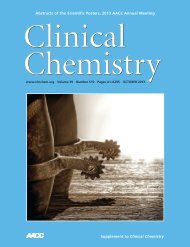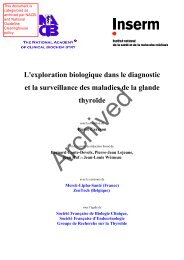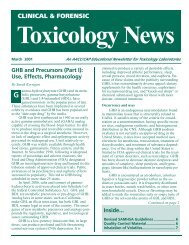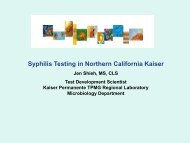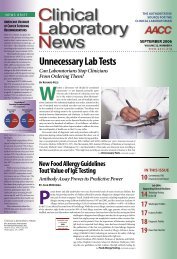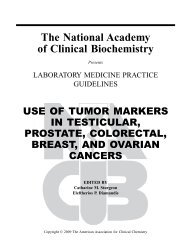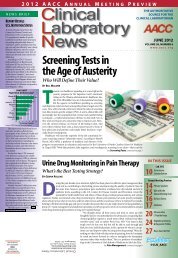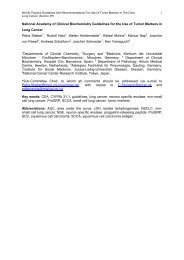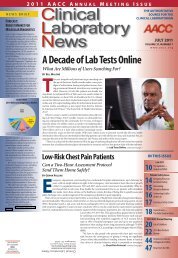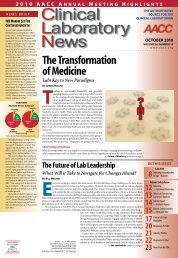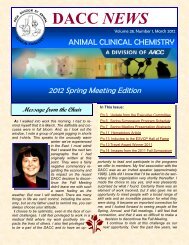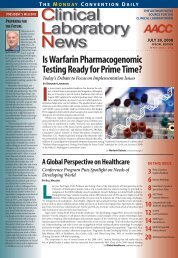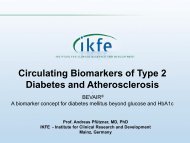Clinical Laboratory News - American Association for Clinical ...
Clinical Laboratory News - American Association for Clinical ...
Clinical Laboratory News - American Association for Clinical ...
Create successful ePaper yourself
Turn your PDF publications into a flip-book with our unique Google optimized e-Paper software.
<strong>Clinical</strong><br />
<strong>Laboratory</strong><br />
<strong>News</strong><br />
ediTorial sTaff<br />
editor—Nancy Sasavage, PhD<br />
senior editors—John Bell, Phil Kibak,<br />
Deborah Levenson<br />
senior editorial assistant—Bill Malone<br />
contributors— Vijaylaxmi Grey, PhD, FCACB,<br />
and Katherine Morrison, MD, FRCPC<br />
business sTaff<br />
v.p. strategic initiatives and<br />
business development—Joseph Perrone, ScD<br />
circulation manager—Mickie Napoleoni<br />
board of ediTors<br />
chair—Jack A. Maggiore, PhD,<br />
BioSafe Laboratories, Chicago, Ill.<br />
members—Nikola Baumann, PhD,<br />
University of Illinois Medical Center at<br />
Chicago, Chicago, Ill.<br />
Thomas Daly, MD,<br />
Eli Lilly and Company, Indianapolis, Ind.<br />
David Grenache, PhD, University of Utah and<br />
ARUP Laboratories, Salt Lake City, Utah.<br />
Elia M. Mears, MS, MT (ASCP), SM<br />
Chabert Medical Center, Houma, La.<br />
Alan T. Remaley, MD, PhD,<br />
National Institutes of Health, Bethesda, Md.<br />
aacc officers<br />
president—Larry A. Broussard, PhD<br />
president-elect—Barbara Goldsmith, PhD<br />
Treasurer—Ann Gronowski, PhD<br />
secretary—Anthony W. Butch, PhD<br />
past-president—Gary L. Myers, PhD<br />
adverTisinG sales<br />
Scherago International, Inc.<br />
525 Washington Blvd, Ste. 3310<br />
Jersey City, NJ 07310<br />
Phone: (201) 653-4777, Fax: (201) 653-5705<br />
E-mail: aacc@scherago.com<br />
president—H.L. Burklund<br />
vice president sales—Jack Ryan<br />
marketing director—Steven A. Hamburger<br />
Traffic manager—Roni Jackling<br />
subscripTions<br />
<strong>American</strong> <strong>Association</strong> <strong>for</strong> <strong>Clinical</strong> Chemistry, Inc.<br />
1850 K Street, NW, Suite 625<br />
Washington, DC 20006<br />
Phone: (202) 857-0717 or (800) 892-1400<br />
Fax: (202) 887-5093<br />
E-mail: custserv@aacc.org<br />
Subscriptions to <strong>Clinical</strong> <strong>Laboratory</strong> <strong>News</strong> are<br />
free to qualified laboratory professionals in<br />
the United States. AACC members outside<br />
the U.S. pay $72 <strong>for</strong> postage. The subscription<br />
price <strong>for</strong> those who do not qualify <strong>for</strong> a<br />
free subscription is $72/year in the U.S. and<br />
$109/year outside the U.S. Back issues may be<br />
ordered <strong>for</strong> $10 as available. For more in<strong>for</strong>mation,<br />
contact the AACC Customer Service<br />
Department at (800) 892-1400 or<br />
(202) 857-0717 or custserv@aacc.org.<br />
ediTorial correspondence<br />
Nancy Sasavage, PhD, Editor<br />
<strong>Clinical</strong> <strong>Laboratory</strong> <strong>News</strong><br />
1850 K Street, NW, Suite 625<br />
Washington, DC 20006<br />
Phone: (202) 835-8725 or (800) 892-1400<br />
Fax: (202) 835-8725<br />
E-mail: nsasavage@aacc.org<br />
Contents copyright © 2008 by the <strong>American</strong><br />
<strong>Association</strong> <strong>for</strong> <strong>Clinical</strong> Chemistry, Inc.,<br />
except as noted. Printed in the U.S.A.<br />
<strong>Clinical</strong> laboratory news (issn 0161-9640)<br />
is the authoritative source <strong>for</strong> timely analysis<br />
of issues and trends affecting clinical<br />
laboratories, clinical laboratorians, and the<br />
practice of clinical laboratory science.<br />
4 CliniCal laboratory news JuLy 2008<br />
Vince Miller, MD, also at Memorial Sloan-<br />
Kettering, the trial involved 101 patients<br />
and found that the presence of an EGFR<br />
mutation was a much stronger predictor of<br />
both responsiveness to and prolonged survival<br />
on erlotinib than EGFR amplification.<br />
Tumors with EGFR amplification without<br />
mutation showed only rare responses and<br />
minimal survival benefit (Journal of <strong>Clinical</strong><br />
Oncology 2008; 26: 1472–1478). He also<br />
questioned whether other aspects of the<br />
NCI trial are new. “In some earlier, major<br />
studies, predictive statements were based<br />
only on the small subset of patients in<br />
which paraffin samples could be retrospectively<br />
obtained <strong>for</strong> testing. But now, most<br />
major cancer centers are running clinical<br />
trials with procurement of more complete<br />
sample sets, so there is nothing special or<br />
unique about what is being proposed by<br />
Critical Path.”<br />
Questions from the Lab Community<br />
While USDS could provide a valuable service<br />
to diagnostic manufacturers—access<br />
to high quality samples <strong>for</strong> validating new<br />
assays according to standard procedures—<br />
Myers predicts that lab directors at academic<br />
hospitals will have many questions<br />
about it.<br />
The first concerns funding. “C-Path has<br />
taken on a daunting task. Who will pay<br />
<strong>for</strong> it?” he asked. According to de Mars,<br />
the Science Foundation of Arizona has<br />
granted the seed money, and USDS is still<br />
developing a business model and raising<br />
more money <strong>for</strong> the project. She did not<br />
divulge the identities of potential funders,<br />
but she did note that C-Path is eying federal<br />
legislation introduced last year by U.S.<br />
Rep. Gabrielle Gif<strong>for</strong>ds (D-Ariz.). The<br />
Safe and Effective Drug Development Act<br />
(H.R. 2592) would allow FDA to enter into<br />
public-private partnerships that would accelerate<br />
development of medical products.<br />
While the legislation would prohibit these<br />
partnerships from accepting manufacturers’<br />
money, it would also establish an exception<br />
that allows partnerships to accept<br />
funds from a consortium of companies<br />
with FDA-regulated products. The HHS<br />
Secretary would have to deem the situation<br />
free from conflicts of interest and issue a<br />
waiver, according to the bill.<br />
Current C-Path plans do not call <strong>for</strong><br />
diagnostics companies to fund USDS directly.<br />
Rather, companies would pay fees<br />
<strong>for</strong> services that would generate validation<br />
data. “The data would be theirs, and they<br />
could use it <strong>for</strong> FDA submission,” de Mars<br />
explained, adding that USDS would base<br />
fees on the scope of services provided.<br />
Competition <strong>for</strong> Academic Labs?<br />
Another concern is that several academic<br />
medical centers already provide many<br />
of the services USDS hopes to offer, Myers<br />
added. That’s a sentiment shared by<br />
Ladanyi. “The C-Path sample set will be<br />
nice. But this type of sample set is already<br />
being created at many cancer centers,” he<br />
pointed out.<br />
Gutman agrees that much of what C-<br />
Path proposes that USDS do isn’t exactly<br />
new. “The idea of collecting samples is<br />
good, and any mechanism <strong>for</strong> creating a<br />
panel of reference samples is good. But<br />
they already exist,” he said. “However, this<br />
[USDS] would be more deliberate and focused<br />
than other activities. It would be interesting<br />
if it got some <strong>for</strong>mal status.”<br />
USDS would compete with academic<br />
labs that diagnostics companies now support<br />
by paying <strong>for</strong> studies to validate experimental<br />
assays, Myers continued. Addressing<br />
this concern, de Mars noted that FDA<br />
usually requires that submissions include<br />
data from three laboratories, one of which<br />
is usually a diagnostic company’s own<br />
facility. She sees room <strong>for</strong> both USDS and<br />
academic medical center labs in the process,<br />
because USDS and an academic lab<br />
could be the second and third locations.<br />
According to deMars, “USDS will initially<br />
focus on development of standards <strong>for</strong><br />
cancer statistics. In its neutral position,<br />
USDS would have the capacity to run com-<br />
peting assays, from any manufacturers, on<br />
the same set of standard samples. Also,<br />
with eventual growth and expansion of<br />
services, USDS may need to outsource to<br />
other labs.”<br />
Honing in on Homebrews<br />
Both the USDS proposal summary and de<br />
Mars point to another role Myers believes<br />
will be of concern to many lab directors:<br />
review of laboratory-developed assays. De<br />
Mars said USDS could provide standardized<br />
evaluation of lab-developed tests, in<br />
a process she likened to certification. “This<br />
USDS ‘certification’ would aid in marketing<br />
tests that manufacturers develop inhouse,”<br />
she explained, adding that companies<br />
could have USDS test their reagents on<br />
standard sample sets and publicize the data<br />
in the hope that it spurs sales.<br />
Myers also wondered if USDS could be<br />
a mechanism <strong>for</strong> FDA regulation of labdeveloped<br />
tests. Members of the HHS Secretary’s<br />
Advisory Committee on Genetics,<br />
Health and Society are among those who<br />
support FDA oversight. At its most recent<br />
meeting in February, the committee said it<br />
would recommend that all lab-developed<br />
tests come under the FDA’s watch to ensure<br />
their effectiveness and patients’ safety.<br />
At that meeting, Gutman said that while<br />
FDA does have authority to regulate these<br />
assays, it lacks the resources to do so. “It’s<br />
not possible [to oversee all assays], but the<br />
high-risk tests belong at the FDA,” he said<br />
during the meeting. But Gutman told CLN<br />
that FDA “has not established specific goals<br />
<strong>for</strong> how USDS work might be applied to<br />
FDA testing oversight.”<br />
Whatever USDS’s scope, de Mars hopes<br />
it will bring the benefits of pharmacogenomics<br />
to more cancer patients. “Companion<br />
diagnostics are really the dawn<br />
of a new era. Be<strong>for</strong>e, cancer patients were<br />
all treated with a ‘one-drug-fits-all’ strategy,”<br />
she explained. “Now drugs have been<br />
developed that benefit a subset of patients.<br />
We are moving toward personalized medicine,<br />
and USDS can help advance that<br />
further.” CLN



